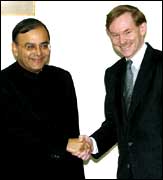Home > Business > Business Headline > Report
India slams US over BPO ban
Josy Joseph in New Delhi |
February 16, 2004 14:44 IST
Last Updated: February 16, 2004 15:36 IST
 India on Monday hit back at the United States, which wanted New Delhi to open up its markets, especially agriculture, to enable Washington to lift the ban on outsourcing services.
India on Monday hit back at the United States, which wanted New Delhi to open up its markets, especially agriculture, to enable Washington to lift the ban on outsourcing services.
"It is strange that on the one hand, people are talking about opening of market, and on the other hand, banning business process outsourcing. Our agriculture is fragile as it is not subsidised, like in the US," Commerce Minister Arun Jaitley said after an hour-long meeting with US Trade Representative Robert Zoellick in New Delhi.
India conveyed its concerns over the growing number of American laws against outsourcing to the visiting US Trade Representative Robert Zoellick who wound up his two-day visit asking India to further open its market.
Zoellick called on both sides to work around the sensitivities over job loss and reduced agricultural subsidies in the two countries.
He held long discussions on Sunday day over dinner and for an hour on Monday with Commerce Minister Arun Jaitley and National Security Advisor Brajesh Mishra.
The USTR argued that India would be one of the key beneficiaries of the international trade regime that the US and others are trying to bring through World Trade Organisation's Doha round of negotiations.
Zoellick stopped over in India as part of his whirlwind tour of the globe, across Asia, Europe and Africa, to try and give wing to the international trade negotiations in 2004 from the ashes of Cancun.
However, India greeted Zoellick with its strong concerns over the increasing number of legislations against outsourcing from US.
The Indian side observed there was a sort of duality in US stand, on the one hand asking better access to Indian markets while on the other refusing access to its own market.
Zoellick said legislations in the United States against outsourcing 'reflect anxiety in the US about losing jobs.' But trade involves change and people are concerned about change, he said.
Trade is a two-way street, where both sides should benefit, Zoellick said, asking India to open its market further. The USTR argued that his country was suffering a $500 billion deficit in global trade and India itself enjoyed a $9 billion surplus in bilateral trade with the US. So the US cannot be accused of deploying bullying tactics in international trade.
Zoellick said the most challenging aspect of the Doha round of talks was over agriculture. He said the US was willing to bring down the subsidies given to its farmers if the European Union and others are ready to follow.
In India, he admitted, it was a sensitive issue. But the countries will have to 'work around' the sentiments, he said. Export subsidies in agriculture were almost non-existent in the US, while the EU provides some $5 billion export subsidy in a year.
Zoellick argued that if agricultural products from the US and other countries are freely allowed access to the Indian markets then the middle class would have access to cheaper food products but the entire issue has to be dealt with the sensitivity of farmers kept in mind.
"We can work together. At the same time we need to work around sensitivities," Zoellick said.
His visit was also in the context of the improving US economy, but it was important to employ additional trade opportunities outside the US to make the recovery better, he said.
Zoellick had written to all his WTO colleagues around the world in January seeking their cooperation to do a 'commonsense assessment' to resurrect the trade talks that broke down in Cancun.
He received positive response from European Union and some other nations who feel precious opportunity was lost in Cancun.
Zoellick took off from the US a few days back and went to Japan, China, Singapore, and other countries in South East Asia before touching down in Islamabad. This afternoon he took off from India for Cape Town, where from he would visit the Sub-Saharan region before dropping by at the WTO headquarters at Geneva.
Then he would be off to Paris, and take a short break back home before pushing off for consultations with Latin American countries.
Zoellick said he is visiting the entire globe basically to find answers to five points:
Are countries interested in moving ahead on Doha round?
What are the top priorities of the countries?
What is their suggestion about what the US can do for progress on trade talks?
Try and get a sense of what other countries can do.
How do we make progress during the course of this year?
Additional inputs: PTI